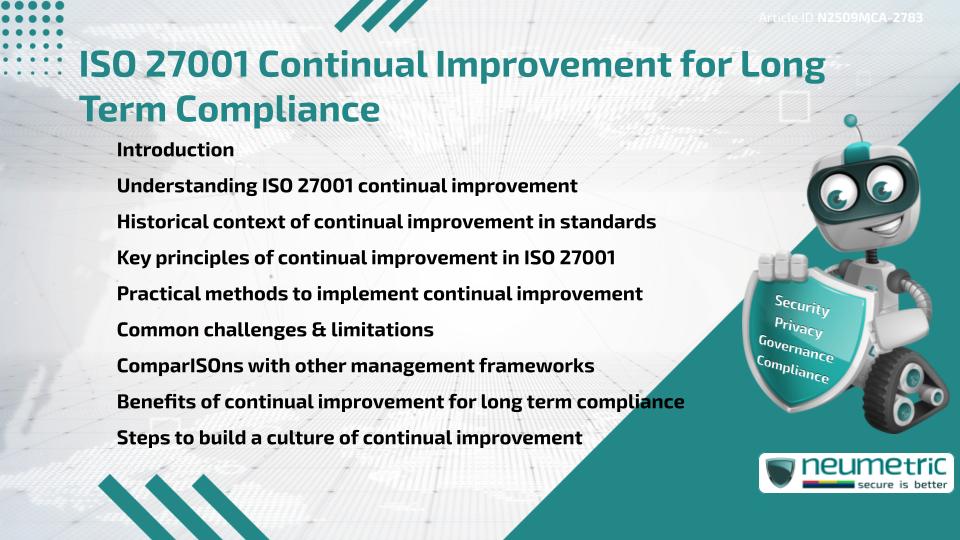Table of Contents
ToggleIntroduction
ISO 27001 continual improvement is a core requirement for achieving & maintaining certification. It ensures that an organisation’s Information Security Management System [ISMS] remains effective, responsive to new Risks & aligned with Business Objectives. By embedding continual improvement into daily practices, Organisations can maintain compliance, improve resilience & foster long-term trust. This article explains the principles, benefits, challenges & practical steps for Organisations pursuing continual improvement.
Understanding ISO 27001 continual improvement
Continual improvement in ISO 27001 means more than fixing problems as they arise. It involves regularly reviewing processes, identifying weaknesses & applying enhancements to Policies, technologies & Employee practices. The objective is to ensure that the ISMS evolves with changing Threats, legal requirements & organizational needs.
Historical context of continual improvement in standards
The concept of continual improvement traces back to Quality Management movements of the mid-20th century, notably the Deming Cycle (Plan-Do-Check-Act). ISO adopted this model into its management system standards, including ISO 9001 & ISO 27001. The emphasis on improvement reflects the belief that no system remains effective without regular evaluation & adaptation.
Key principles of continual improvement in ISO 27001
The Standard highlights several principles, including:
- Proactive identification of Risks & Vulnerabilities.
- regular Audits & management reviews.
- Corrective & preventive actions.
- Performance monitoring through metrics & reporting.
- Employee engagement & awareness initiatives.
Together, these principles ensure a cycle of review, action & enhancement.
Practical methods to implement continual improvement
Organisations can adopt practical strategies, such as:
- Conducting frequent Risk Assessments.
- Encouraging feedback from staff & Stakeholders.
- Implementing incident reporting & root cause analysis.
- Benchmarking against industry practices.
- Leveraging technology for monitoring & automation.
These methods should be supported by documented procedures & leadership commitment.
Common challenges & limitations
Despite its benefits, ISO 27001 continual improvement faces hurdles. Organisations may struggle with limited resources, competing business priorities or lack of staff expertise. Resistance to change can also slow progress. Furthermore, measuring improvement in security practices is often less straightforward than in other areas, requiring careful use of metrics.
Comparisons with other management frameworks
Other frameworks such as ISO 9001 & ITIL also emphasize continual improvement. However, ISO 27001 applies these principles specifically to Information Security, with stronger focus on confidentiality, integrity & availability of data. Unlike ITIL, which concentrates on IT service management, ISO 27001 integrates continual improvement into Risk Management & organizational Governance.
Benefits of continual improvement for long term compliance
Adopting continual improvement brings multiple advantages:
- Ongoing compliance with ISO 27001 requirements.
- Stronger adaptability to emerging security Risks.
- Improved operational efficiency & reduced incidents.
- Enhanced reputation & Customer confidence.
- Long-term resilience & sustainability.
Steps to build a culture of continual improvement
To embed continual improvement, Organisations should:
- Promote leadership commitment to security.
- Train Employees regularly on ISMS practices.
- Create open channels for reporting & feedback.
- Integrate continual improvement into performance objectives.
- Use internal audits as tools for growth, not just compliance.
By building a culture of continual improvement, Organisations turn compliance into a sustainable strength.
Takeaways
- ISO 27001 continual improvement keeps ISMS effective & responsive.
- It requires proactive Risk Management & regular reviews.
- Practical methods include audits, Risk Assessments & feedback systems.
- Challenges include resource constraints & measuring improvements.
- Long-term benefits include compliance, resilience & Customer Trust.
FAQ
What is ISO 27001 continual improvement?
It is the process of regularly reviewing & enhancing an ISMS to ensure effectiveness & compliance with ISO 27001.
Why is continual improvement important in ISO 27001?
Because Threats, Technologies & Business Environments change, making ongoing adaptation essential.
How often should Organisations review their ISMS?
Reviews should be conducted at planned intervals, typically annually, but more frequently for high-Risk environments.
What tools support continual improvement?
Tools include Risk Assessment software, Audit checklists, incident management systems & performance dashboards.
What challenges hinder continual improvement?
Challenges include limited budgets, lack of expertise & resistance to organisational change.
Can continual improvement help in passing audits?
Yes, it demonstrates commitment to ISO 27001 principles, making audits smoother & more effective.
Need help for Security, Privacy, Governance & VAPT?
Neumetric provides organisations the necessary help to achieve their Cybersecurity, Compliance, Governance, Privacy, Certifications & Pentesting needs.
Organisations & Businesses, specifically those which provide SaaS & AI Solutions in the Fintech, BFSI & other regulated sectors, usually need a Cybersecurity Partner for meeting & maintaining the ongoing Security & Privacy needs & requirements of their Enterprise Clients & Privacy conscious Customers.
SOC 2, ISO 27001, ISO 42001, NIST, HIPAA, HECVAT, EU GDPR are some of the Frameworks that are served by Fusion – a SaaS, multimodular, multitenant, centralised, automated, Cybersecurity & Compliance Management system.
Neumetric also provides Expert Services for technical security which covers VAPT for Web Applications, APIs, iOS & Android Mobile Apps, Security Testing for AWS & other Cloud Environments & Cloud Infrastructure & other similar scopes.
Reach out to us by Email or filling out the Contact Form…


